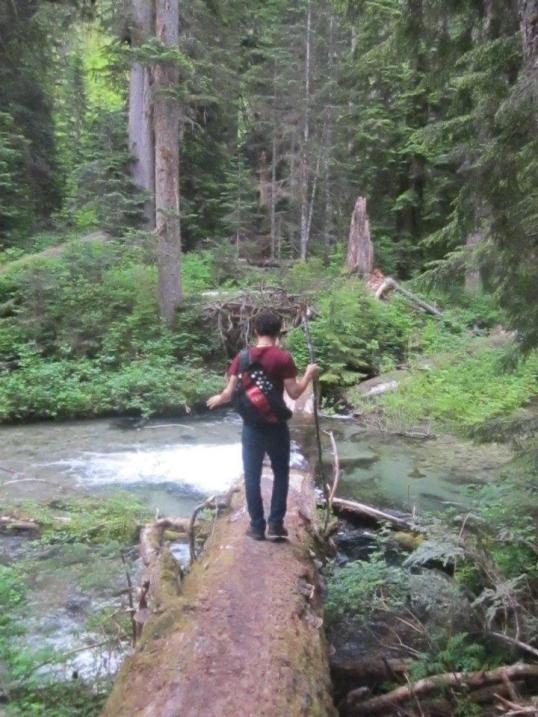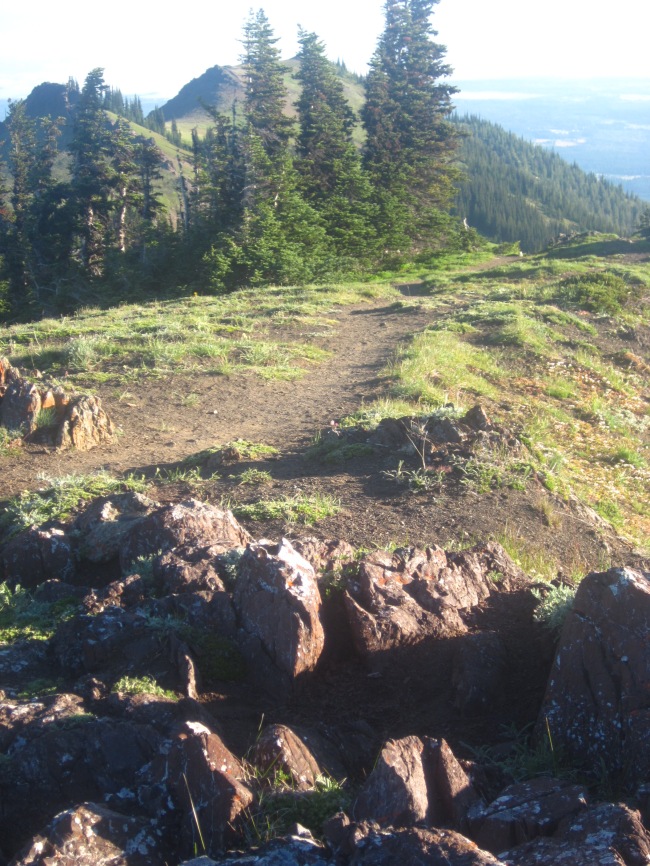I love me some nature — the animals, the walking, hunkering down in tents, snuggling in cabins, a good fire, the smell of the dirt, and the pure feeling of being immersed in scenery porn. There are many ways to go and be outdoors. I’m not about to tell anybody the ‘right way’ to enjoy nature or what parts should be most important to them. At this time of the year, people are gearing up to go camping and hiking. (Hey, I got a new tent. I’m ready!)
There are things you do in your own backyard or at your friend’s cabin that you can’t do in the back country — or even at a campground designed for car camping. Going into a public space — and most nature in the US is public land — means respecting the ecosystem and rules set up to protect you and the wildlife. If you haven’t hiked or camped a lot, things that seem ‘fun’ or ‘easier’ really fall under the category of ‘unnecessary’ or even ‘dangerous’. And the 41 Camping Hacks article has more than a few tips that aren’t nature friendly. Hell, they aren’t even real hacks. Here is my improved list of 15 tips that’ll help you have a better hiking and camping experience this summer.

That blue heron caught several fish — I was just too slow to photograph it
1. By an inflatable mattress and double it up with a yoga mat. You actually will be able to buy and find the yoga mat — you may already have one. And log onto Backcountry.com and you’ll be able to find plenty of deals on any level and price of inflatable mattress you want. Or just use a mattress — a foam or inflatable one depending on personal preference.

Inflatable mattress + yoga mat. Because let’s face it: many of you probably don’t even know where you can buy those foam pads
2. Using tin cans as a ‘portable food option’ to store bread is nonsensical. Let me give you a tip: the only thing you need to protect your food is a bear canister. This goes for car camping and backpacking. You can usually rent one, some campsites already have them at your site, and you can buy them for around $80. There are places that specifically require canisters, and that’s because canisters reduce the rate of bear/human incidents. Here’s a basic list of where bear canisters are required and where they’re highly recommended. It’s not just bears that get into your food. It’s ‘mini-bears’ — raccoons, squirrels, chipmunks, ect. — and they are vicious little vermin.
3. Don’t glue sandpaper to your match box. Buy storm proof matches and bring a second lighter option (I use a Bic cigarette lighter) for good weather.

4. Biodegradable toilet paper and sanitary wipes should cover all the pooping materials you need. Put them in a ziplock bag. If you’re in an area where you have to pack it out, place the TP bag inside of a second ziploack bag filled with a bit of backing soda. I’ve also used leaves and smooth rocks for TP, but if that thought makes you sad, just don’t go on prolonged wilderness backpacking trips.

I don’t know why you would do this — even when car camping. There are usually running water toilets when you’re car camping — so bringing toilet paper is unnecessary. And are you really going to lug around a coffee can on a hike?
5. Hammocks are cool — in theory. Everyone wants to go outdoors and lounge in a hammock. And you can. No problem. I just think there are cheaper ones than these ones that remind me of baby swings and cost $399.

It’s a $400 baby swing.
6. On the topic of soap and cleanliness: you’re in the outdoors. There is dirt. There are bugs. Don’t try to over-sanitize it because nature will just blow a big, dirty kiss at you. Dr. Bronners soap (unscented) soap is great for camping, and it’s affordable and easy to find. I use it to wash pots, pans, and myself.

This is a day hike during a car camping trip. Charlie’s messenger bag is what we carried to keep snacks, water, and first aid in.
7. I don’t even know what to say about the laundry detergent one. I’ve never seen anyone do this — nor have I ever had a ‘hand washing station’ even when car camping. This isn’t a hack at all — it’s more time consuming to construct and use than just pouring some drinking water over your hands. If you must, get a water filter and use the filtered water to wash your hands. Soap does kill germs, I promise.

This isn’t smart at all. Just use regular water and some soap.
8. This isn’t a hack, either. At the end of the day, all of your pots and pans should either go back in your car or into your bear canister. If you’re not car camping, make sure they’ll fit into the bear canister if you’ve done anything but boil water in them. Despite where you are (established camp ground or primitive site), your pots and pans should definitely not be handing on a tree. I just don’t understand the logic of this one. You can’t wrap those pots in a microfiber towel or put them into a trash bag to ‘keep them clean’? Remember the part about bears and mini-bears? If you’ve cooked food with those, you’re going to have guests coming to sniff at those pans.

Not a hack. If you want animals to come over and investigate your campsite looking for food, do this.
9. The ‘portable washing machine’ is hilarious (and tragic), and it’s another thing I’ve never seen anyone do. Ever, not even in my years of car camping. If you’re out for just 2-3 days, you can bring enough clothes to not have to wash any of them. If you’re on a more extended hiking trip, or feel you really need to wash something, that is what creeks are for. Or, my favorite trick, is to find camp ground showers and crawl in with my clothes on and wash them when I wash myself. Once again, this really isn’t a hack — you’re bringing more things with you that aren’t going to add to the enjoyment of camping. The real hack is showering with your clothes on.

I have never seen anyone do this.
10. There’s a lot of focus on creating lamps and light for your campsite. First, you’re probably going to get plenty of daylight (I’m assuming it’s summer). If you light a campfire, you’ll definitely have enough light. For extra light, flashlights and headlamps are all you should need. If you want ‘mood lighting’, go for it, but don’t use homemade oil lamps. They’re going to be more of a fire hazard than anything. If you’re in your tent, use headlamps when it’s dark. But don’t make hotel shampoo bottles into oil lamps. You will start a forest fire.

Pictured: an unsafe fire hazard
11. This is a picture of what is called ‘disposable hiking tape.’

Uses: none
If you’re hiking, here are two very important things you should do: 1) bring a compass (and know how to use it) and 2) bring a map. If you have problems using a compass and a map, you shouldn’t be going off trail. Hell, in many national parks and forests, there are areas where you specifically should not go off trail because if everyone did this, the ecosystem would get severely damaged. I posted my Olympic hiking photos from March, and we were told that the trail in the Hoh rainforest was a sludge path, but don’t go off the trail because if everyone did, the surrounding plant life would get trampled into mud. Trails are there to keep your clumsy, human feet from stomping all over nature. Many trails are well maintained or at least clear enough that a good (topographic) map should keep you from getting lost.
12. Don’t use a bucket and a milk crate as a disposable toilet. I’ve never seen this done, and it’s just as asinine as the laundry bucket idea. If you’re car camping, there are usually running water toilets. At some more primitive campsites, there are pit toilets. If you’re in the back country, you’re going to be digging catholes. If you’re not comfortable digging a hole and pooping in it, you shouldn’t be camping in the back country. Also, I don’t think I’d want to hike a full minute trying to carry a ‘disposable toilet’.
13. Once more with the light sources: don’t bring unnecessary fire hazards. Your best bet is to bring extra batteries for headlamps and flashlights. The phrase ’emergency light source’ should equal ‘extra batteries’ in your mind.

Pictured: more terrible advice
14. Another quick word about food: Use bear canisters. If you’re car camping, coolers are great, but there’s a reason bear canisters have quickly become the norm in food storage regulations on federal lands — it’s because they work. Most of the food tips on this list aren’t bad — hell, one of the reasons I still go car camping is to bring the dutch oven and make some awesome food over an open fire. But I pack up my food properly at the end of the day.
15. Honorable mentions: there are some tips that are actually good. The instant coffee and the microfiber towel are things I do carry on all my camping trips. They’re easy — and they work for car camping as well as in the back country. A lot of these tips are not applicable if you’re hiking and camping when you have to lug stuff on your back before you get to your campsite. The food ideas are fine for cabin BBQs or car camping, but I won’t be hauling spices with me on the 4 day 45 mile hike I’m taking this summer.

Pictured: all you need to enjoy nature

















